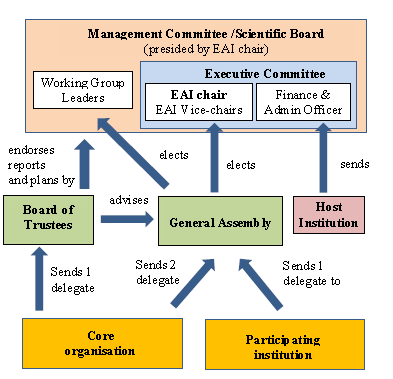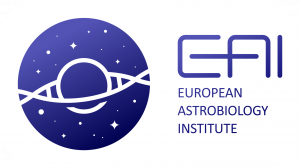EAI Structure
The Interim Board proposes that the Management Committee consists of the following members:
- Chair and Vice-Chairs of the EAI
- Leaders of the Working Groups
- Finance and Administration Officer
- One representative from EANA and one from AbGradE
The Management Committee should meet at least twice per year. It is headed by the Chair of the EAI, or in the chair's absence by one of the vice-chairs. It approves yearly reports of working and activity groups and is responsible for all decisions that are not specifically allocated to the other bodies. It also endorses or amends draft budgets from the Executive Committee and conveys a final proposal to the General Assembly. Furthermore, its task is to prepare meetings of the General Assembly including drafting its agenda and large conferences. It also drafts reports to funding agencies supporting EAI as a whole. Finally, it has the responsibility to compose yearly reports to the General Assembly.
It is suggested that the Chair and up to 3 Vice Chairs will be elected for a 2 year period by the General Assembly. A re-election of the Chair and vice-chairs after this period is possible, but the tenure of the Chair is possible maximally 2 consecutive terms of office, and thus is limited to 6 years. The Chair and Vice Chairs also draft the agenda for the Management Committee meetings.
The Executive Committee consists of the Chair, Vice Chairs, and the Finance and Administration Officer of the EAI. The Executive Committee decides issues concerning the day-to-day running of the EAI following General Assembly and Management Committee decisions. It is also responsible for the administration of the EAI on a daily basis and approves accounting of events and activities of the whole EAI. It also bears the responsibility for the handling of the finances of the EAI according to the budget stipulated by the EAI.
The Interim Board suggests the creation of two types of Working Groups to coordinate the activities of the EAI.
Thematic working groups on scientific themes and Activity Working Groups addressing different activities like training, education, outreach, etc. They will be led by a Leader and a Deputy Leader. We propose the following Working Groups be established initially:
Thematic Working Groups (Working on the scientific themes outlined on the Aims webpage)
- Investigation into formation of planetary systems and detection of habitable planets and moons
- Early Earth environment and habitability
- The pathway to complexity: From simple molecules to first life
- Early life and life under extreme conditions Detection of life in early and extreme terrestrial environments and other celestial bodies
- Historical, philosophical, societal and ethical issues in astrobiology
Activity Working groups
- Policy and Funding (coordinating EAI approaches to governmental and intergovernmental organisations)
- The European Astrobiology Campus (EAC) as affiliated organisation (with the status of an Activity Working Group)
- Fieldwork, field site management
- Access to European Research Infrastructures and Analysis Facilities
- Outreach and corporate identity (Website)
- Dissemination and Intellectual Output
- Industry Liaison
Each WG should be led by a Leader and a Deputy Leader appointed by the General Assembly. The WG Leaders and Deputy Leaders should also be recruited from core organisations or participating institutions. WGs will be requested to submit a yearly report to the Management Committee. Working groups can accept members from organisations outside the EAI, but those people will not be entitled to any refunds stemming from the membership fees contributed by the participating organisations but might be able use funds from other grants obtained by the EAC.
Representatives of Participating Institutions (1 each) as well as Core Organisations (2 each) form the General Assembly of the EAI. It will meet at least annually and its role should be to:
- Decide the general policy of the EAI
- Define the overall structure of the EAI
- Elect the chair and the vice chair(s) of the EAI
- Create and dissolve working groups
- Elect Working Group Leaders and Deputy Leaders (upon suggestion of the working group in question)
- Approve the Yearly Work Plan of EAI
- Approve overall budgets of the EAI
- Choose the Host Institution of the EAI
- Discharge the Executive Committee of its financial responsibility
Every participating institution and core organisation has the right to send one delegate to the General Assembly. Each delegate shall have one vote and cumulative voting by one person for 2 or more participating institutions or core organisation will not be allowed.
The General Assembly can create Project Teams working on special, more focussed research questions and projects. These can be temporary and can involve members of different Working Groups in order to bridge between the different WGs. Project teams can attract funding from other sources, e.g. through the ISSI international Team programme or other smaller scale schemes. They should appoint a Coordinator who reports regularly to the General Assembly and the Management Committee.
- To carry out astrobiology activities at their institution (scientific, outreach, training, dissemination)
- To ensure that members of their institution are aware of the activities of the EAI
- To approach decision makers at their home institution to promote astrobiology and the EAI
- To ensure that a delegate from their Institution is appointed to represent their Institution at the EAI General Assembly
The Interim Board proposes that a Local Coordinator is appointed by the Local team. The Local Coordinator should:
- Coordinate the astrobiology(-related) research activities within her/his institution
- Organise local activities (research projects, courses, outreach)
- Promote astrobiology at the home institution
- Host the EAI Office Administer EAI work including financial administration and governance, communication, and external relations
- Document meetings of governing bodies of the EAI Nominate the Finance and Administrative Officer
- Support the development of proposals for leverage of external funding
- Collect the yearly fees from the participant organisations
- Administrate expenses for meetings and other events

